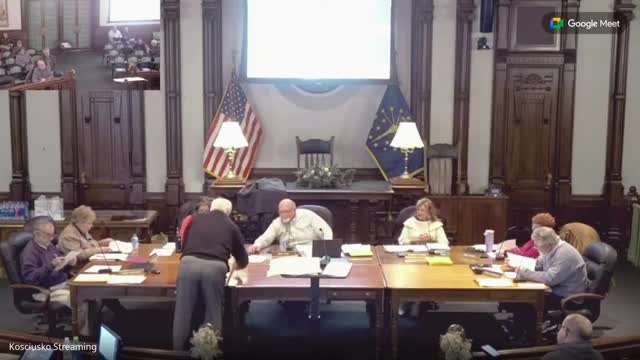Council approves tax abatement request from Louis Dreyfus for Claypool expansion after lengthy debate
Get AI-powered insights, summaries, and transcripts
Subscribe
Summary
After extended discussion about jobs, local basis for grain farmers and TIF revenue, the Kosciusko County Council voted to grant a partial abatement on Louis Dreyfus's October SB-1 filing: a three-year personal-property abatement and a five-year real-estate abatement as included in the SB-1 resolution.
The Kosciusko County Council voted to approve a tax abatement requested by Louis Dreyfus for a major equipment and real-estate investment at its Claypool facility after hearing a detailed presentation and prolonged council discussion.
Company and community case Louis Dreyfus representatives told the council the planned project would invest about $50.2 million at the Claypool site in new manufacturing, logistics and real-estate improvements. Jeremy Mullins of Louis Dreyfus said the expansion would raise the plant's intake capacity by roughly 25,000 bushels per day (about 9 million additional bushels per year) and provide continuity for roughly 160 current employees. "Mostly what we're trying to do is protect the 160 jobs that we currently have," Mullins said.
Mullins and company supporters said the investment would sustain local processing capacity and that vertically integrated operations (biodiesel, glycerin, lecithin, packaging) make the Claypool facility more resilient. They also said prior investments and community cooperation, including work with the town of Claypool on wastewater and infrastructure issues, supported the company's case for abatement.
Council discussion and concerns Council members probed whether the increased intake would come from local production or from a wider trading region and discussed effects on farmers' basis (the local premium paid to growers). Members also discussed prior abatements, TIF revenues, local infrastructure and the possibility that abatements help retain existing companies that might otherwise relocate or consolidate elsewhere.
Author and structure of the request County staff and the abatement committee presented the SB-1 schedule submitted by Louis Dreyfus (SB-1 filed Oct. 23). The resolution brought to the council recommended a three-year personal-property abatement and a five-year real-estate abatement, consistent with the SB-1 draft and the county's incentive policy.
Vote and outcome A motion to approve the abatement as requested carried after debate. Council members discussed several procedural votes during the meeting (including an earlier abstention that was later changed) and ultimately the council recorded a majority vote in favor of the requested abatement schedule. The approved terms were the three-year personal-property abatement and a five-year real-estate abatement as described in the SB-1 filing presented to the council.
What the abatement does and timing County staff explained that, for personal property abatements, the largest percentage reduction is in the first year and the abatement percentage phases down in subsequent years; county staff also noted that assessed-value impacts and actual tax revenue implications are not always linear and are affected by other abatements, TIFs and future abatements. Louis Dreyfus representatives acknowledged the company filed the SB-1 on Oct. 23 and said plant work would begin in January; company representatives and county staff explained the abatement's tax benefits would typically not be fully reflected in county revenue until several years later under the statutory timeline for abatement capture and tax cycles.
Next steps and community context Louis Dreyfus said it will proceed with capital work consistent with the SB-1 filing and that the company has worked with the town of Claypool and county engineers on infrastructure issues. Council members asked county staff and the redevelopment commission to track TIF and abatement expirations and to report on expected revenue flows as existing abatements phase off in coming years.
